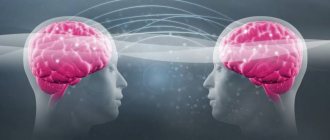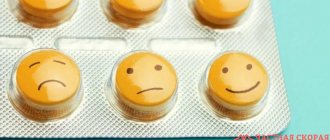Venlafaxine
Use during pregnancy and breastfeeding
Venlafaxine should not be prescribed to pregnant and breastfeeding women, because
The safety of the drug during pregnancy and lactation in women has not been sufficiently established, due to the fact that there are no adequately controlled clinical studies on a sufficiently large sample of such patients. This concerns the health of both the mother and, to a greater extent, the fetus/child. Women of childbearing age should be warned about this before starting treatment and should immediately consult a doctor if they become pregnant or plan to become pregnant during treatment with the drug. Venlafaxine and its metabolite (EFV) are excreted into breast milk. If it is necessary to take the drug during lactation, breastfeeding must be stopped.
In practice, there are cases of prescribing venlafaxine to mothers during pregnancy and shortly before childbirth, when in a particular situation the expected benefit to the mother outweighs the potential risk to the fetus. In these cases, newborns often experienced complications that required: increased hospitalization, maintenance of breathing and tube feeding. These complications can develop immediately after childbirth and are also typical when taking other antidepressants from the SNRI group or SSRIs (not containing venlafaxine). In such cases, the following clinical symptoms in newborns have been reported: respiratory disorders, cyanosis, apnea, convulsions, temperature instability, feeding difficulties, vomiting, hypoglycemia, muscle hypertension or hypotonia, hyperreflexia, tremor, trembling, irritability, lethargy, constant crying, drowsiness or insomnia. Such disturbances may indicate the serotonergic effects of the drug Venlafaxine.
If venlafaxine was used during pregnancy and maternal treatment was completed shortly before delivery, the newborn may experience withdrawal symptoms. In such a newborn, the presence of serotonin syndrome or neuroleptic malignant syndrome should be excluded. Epidemiological evidence suggests that use of SSRIs during pregnancy, especially late in pregnancy, may increase the risk of persistent neonatal pulmonary hypertension.
special instructions
Suicide and suicidal behavior
Depression is associated with an increased risk of suicidal ideation, self-harm, and suicide (suicidal behavior). This risk persists until significant remission occurs. Since improvement may not be observed during the first few weeks of therapy or even longer, patients should be closely monitored until such improvement occurs. Based on accumulated clinical experience, the risk of suicide may increase in the early stages of recovery.
Patients with a history of suicide attempts or high levels of suicidal ideation prior to treatment are at greater risk for suicidal ideation or suicide attempts and should be closely monitored. A meta-analysis of placebo-controlled clinical trials of antidepressants in adult patients with mental disorders found that antidepressants were at increased risk of suicidal behavior compared with placebo in patients under 25 years of age. Drug treatment of these patients, and in particular those at high risk of suicide, should be accompanied by careful monitoring, especially early in therapy and during dose adjustment. Patients (and caregivers of such patients) should be warned to monitor for any signs of clinical worsening, suicidal behavior or ideation, or unusual changes in behavior, and to seek immediate medical attention if these symptoms occur.
In a small number of patients taking antidepressants, incl. venlafaxine, aggression may occur during initiation of treatment, dose changes, or discontinuation of treatment.
Clinical studies conducted to date have not revealed tolerance or dependence to venlafaxine. Despite this, as with other drugs that act on the central nervous system, the physician should closely monitor patients for signs of drug abuse, as well as patients with a history of such symptoms.
Special patient groups
Venlafaxine is not approved for use in children.
In patients with a history of aggression, venlafaxine should be used with caution.
In patients with affective disorders, bipolar disorder when treated with antidepressants, incl. venlafaxine, hypomanic and manic states may occur. Like other antidepressants, venlafaxine should be used with caution in patients with a history of mania. Such patients require medical supervision.
Convulsive disorders may occur during therapy with venlafaxine. As with all antidepressants, venlafaxine should be used with caution in patients with a history of seizure disorders and such patients should be closely monitored. Treatment should be discontinued if seizures develop.
Akathisia
The use of venlafaxine has been associated with the development of akathisia, which is characterized by an unpleasant feeling of internal motor restlessness for the patient and manifested in the patient’s inability to sit quietly in one position for a long time or remain motionless for a long time. This condition may occur at the beginning of treatment and during the first weeks of treatment. In patients who develop such symptoms, increasing the dose is not recommended.
Bipolar disorder
Before starting treatment, it is necessary to identify those patients who are at risk for bipolar disorder. Such a check should include a detailed examination of the medical history, incl. family, to identify cases of suicide, bipolar disorder. It should be noted that venlafaxine is not recommended for use in the treatment of bipolar depression.
Use in patients with concomitant diseases
Clinical experience with the use of venlafaxine in patients with concomitant diseases is limited.
It should be used with caution in patients with diseases in which the effect of venlafaxine on hemodynamic parameters and/or metabolism may be significant.
Patients should be warned to immediately consult a doctor if a rash, urticaria or other allergic reactions occur.
Some patients while taking venlafaxine experienced a dose-dependent increase in blood pressure and/or an increase in heart rate, so regular monitoring of blood pressure and ECG is recommended, especially during the period of adjusting or increasing the dosage of venlafaxine. In post-marketing experience with venlafaxine (overdose), fatal cardiac arrhythmias have been reported. Before prescribing venlafaxine to patients at high risk of developing serious cardiac arrhythmias, the ratio of the likely benefit to the possible risk of use should be assessed.
Patients, especially the elderly, should be warned about the possibility of dizziness and impaired balance in order to prevent injury.
While taking venlafaxine, especially in conditions of dehydration or decreased blood volume (including in elderly patients and patients taking diuretics), hyponatremia and/or syndrome of insufficient secretion of antidiuretic hormone may occur.
Venlafaxine has not been studied in patients with recent myocardial infarction and decompensated heart failure. The drug should be prescribed to such patients with caution.
Taking SSRIs or venlafaxine in patients with diabetes may cause changes in plasma glucose levels. Dosage adjustments of insulin and/or antidiabetic medications may be required.
During treatment, it is recommended to refrain from drinking any alcohol-containing drinks.
The safety and effectiveness of venlafaxine in combination with weight loss medications (including phentermine) have not been established. The simultaneous use of venlafaxine and drugs that reduce body weight is not recommended.
Women of childbearing potential should use appropriate contraception while taking venlafaxine.
Explanations of special symptoms and conditions that may occur during treatment with the drug
Dry mouth occurs in 10% of patients receiving venlafaxine. This may increase your risk of developing tooth decay. Patients should practice good oral hygiene.
The use of venlafaxine may cause the development of akathisia, characterized by subjective discomfort or restlessness and the need to move frequently, often accompanied by an inability to sit or stand still. This mostly occurs during the first few weeks of treatment. Increasing the dose in patients who develop these symptoms may cause undesirable effects.
In placebo-controlled clinical trials, a clinically significant increase in serum cholesterol was reported in 5.3% of patients. Cholesterol level control is necessary during long-term treatment.
Withdrawal syndrome
When stopping treatment, withdrawal symptoms are common, especially if it is stopped abruptly. The risk of withdrawal syndrome may depend on several factors, including the duration of treatment, the size of therapeutic doses and the rate of dose reduction. These symptoms are very rarely reported in patients who accidentally missed taking the drug.
Withdrawal symptoms usually occur within the first few days after stopping treatment. These symptoms usually go away within 2 weeks, although in some people they may last 2-3 months or more. It is recommended to gradually reduce the dose of venlafaxine when stopping the drug - over several weeks or months, depending on the severity of the clinical symptoms of the disease.
Serotonin syndrome
Taking venlafaxine, like other serotonergic drugs, can cause serotonin syndrome, a potentially life-threatening condition, especially when used concomitantly with other drugs that can affect the serotonergic neurotransmitter systems such as MAO inhibitors.
Symptoms of serotonin syndrome may include mental status changes (agitation, hallucinations, coma), autonomic instability (tachycardia, blood pressure lability, hyperthermia), neuromuscular disorders (hyperreflexia, incoordination), and/or gastrointestinal symptoms (nausea, vomiting). , diarrhea).
Impact on the ability to drive vehicles and operate machinery
During the treatment period, care should be taken when performing potentially hazardous types of work that require increased concentration and speed of psychomotor reaction (including driving a car and operating machinery).
Venlafaxine is an SSRI antidepressant.
In the article about the types of antidepressants, I already told you what they are, and scared you with the abbreviations SSRI, TCA, SNRI, etc. Let me briefly remind you what and how.
The body of a depressed person is very talented at harming itself. He produces serotonin, norepinephrine and dopamine, which would be very useful for depression, but he hops them! - and quickly disposed of it. So much so that we didn’t even have time to notice whether we had them or not. Antidepressants “give the body a hand” so that it does not become willful, they take away hormones that are already preparing to go into the trash, and send them where they need to be - into the blood, so that they do not allow us to drink away from melancholy.
SSRIs (escitalopram, paroxetine) take away only serotonin, tricyclic antidepressants (amitriptyline) take away all three hormones, but at the same time they also hit the body in the head so that it doesn’t become willful, which is why we then become dull and constantly want to sleep and eat at the same time. Eat a lot.
So - if serotonin alone is not enough for you, and without its faithful brothers you get apathy, and tricyclics make you sleepy on the move, then there are also SNRIs - selective serotonin and norepinephrine reuptake inhibitors. This is our Velaxin.
This is by no means a first-line drug. It will be prescribed when everything else has been tried and it does not have the desired effect. Kind of like what happened to me. Since I’m becoming a vegetable from SSRIs, and from tricyclics I’m gaining 20 kg.
Venlafaxine: withdrawal syndrome
I read that Velaxin has even more severe withdrawal symptoms than Paxil. Bye, I think I got off Paxil twice, it’s no big deal. Oh, how wrong I was...
My doctor and I decided to follow the scheme known on the Internet: we stop Velaxin at once and immediately start taking fluoxetine. The latter has a longer half-life, so such a transition will avoid trouble. So here it is.
Never do this!
Stop Velaxin very slowly, gradually adding fluoxetine. This is the only way to minimize withdrawal symptoms. I felt sick, shaky, glitchy, shivering, and generally wanted to die. You can read more here.
If fluoxetine is not available, then discontinuation of venlafaxine should take at least a month. We are reducing it very little by little. And all the time soon after the withdrawal, most likely you will experience some kind of unpleasant condition, but it will be short-lived and not strong (not like mine).
By the way, a certain part of the bad reviews of Velaxin tell exactly how they took it, it didn’t help them, they stopped drinking it (without consulting a doctor) and almost died. Don't be like that.
Venlafaxine: indications for use
- Depression, especially long-term and poorly responsive to other medications
- Generalized anxiety disorder (when you not only worry periodically, but live with this very anxiety around the clock)
- Panic disorder (you are afraid to leave the house in case you have a panic attack, you are afraid of stuffy small rooms and the subway, as well as certain situations - for example, being alone at home)
- Social phobias (you are afraid to communicate with people, do not want social contacts, and in general, would like to go into the forest as a hermit)
Are there any possible side effects?
Naturally, like any other antidepressant, this drug can lead to some side effects. Complications are quite varied, here are the most common ones:
- Quite often there are disturbances in the functioning of the digestive system, in particular nausea and loss of appetite, abdominal pain, dry mouth, constipation, and dyspepsia. It is extremely rare that pancreatitis and hepatitis develop during therapy.
- Symptoms from the cardiovascular system are also possible, including a decrease or increase in blood pressure, arrhythmia, tachycardia, and hyperemia of the skin. Ventricular fibrillation and tachycardia occasionally develop.
- Metabolic disorders are possible, for example, a decrease or sharp increase in body weight, an increase in cholesterol levels. Rarely, while taking pills, a decrease in the secretion of antidiuretic hormone and an increase in prolactin levels are observed.
- Common side effects include weakness, dizziness, severe yawning, drowsiness, nightmares, muscle hypertonicity, and increased nervous excitability. Nervous system disorders also include asthenia, tremor, apathy, fainting, and hallucinations. Occasionally, therapy leads to the development of mania, coordination problems, convulsions, delirium, and psychomotor restlessness.
- Possible changes in the lymphatic system and hematopoiesis, including hemorrhagic syndrome, minor hemorrhages in the skin and mucous membranes, thrombocytopenia, and less commonly, aplastic anepia, pancytopenia and agranulocytosis.
- Some patients complain of problems with urination.
- There is a possibility of disruption of the senses, which is expressed by the appearance of tinnitus, changes in taste, problems with accommodation, and decreased vision.
- Therapy can affect the quality of sexual life, causing decreased libido, erectile dysfunction, problems with ejaculation, changes in the menstrual cycle, and inability to achieve orgasm.
- Tablets can provoke an allergic reaction, which is accompanied by the appearance of a skin rash, redness, hives, and swelling. Erythema and anaphylactic shock occur less frequently.
- There are some other side effects that may occur during treatment. Sometimes patients complain of increased sweating, hair loss (extremely rare), severe shortness of breath, and pulmonary eosinophilia. Sometimes muscle spasms, myalgia, and arthralgia are observed.
It is worth noting that the occurrence of side effects is sometimes due to the fact that the daily dose is too high. However, in other cases, complete discontinuation of the medication may be necessary. If you notice any deterioration, you should consult a doctor as soon as possible.
Venlafaxine: reviews from doctors
Of those with whom I spoke, few use this drug. And even then most often at the request of the patient. I don’t know why this is so, because I can’t say that the drug is somehow very scary. And the famous online doctor Gorbatov, in general, it seems that he only uses escitalopram and venlafaxine.
Normal doctors complain about the strategy of their colleagues. If the drug is prescribed, it is in too low doses, on which you will not be able to swim much. So it turns out that a person is told that he will now take a very strong antidepressant, they prescribe him 75 mg, and then zilch. And no effect, complete disappointment.
In general, they are all for it, but not as a first-line drug, naturally, and necessarily in a prolonged form.
Can I buy venlafaxine without a prescription?
No you can not. And you don’t need to assign this to yourself. Go to the PND or to a private psychiatrist, let him write a prescription. The danger here is that now they may have given it to you just like that, but next time they won’t give it to you, the drug will run out, and you will experience severe withdrawal symptoms. For the same reason, do not forget to renew your prescriptions with your doctor.
Self-nominators are another group of writers of bad Velaxin reviews. They don’t know where to start or how to select the dosage; they drink 150 mg at once, and then the ambulance takes them away.
Venlafaxine: side effects
Nausea, vomiting, diarrhea, fainting, anaphylactic shock and sudden death are standard, almost any antidepressant gives this, and nervous individuals, after reading the instructions, then refuse to take it.
Due to the stimulating effect of venlafaxine, insomnia, increased blood pressure, tachycardia, aggression, and anxiety may occur. This usually goes away as you get used to the drug.
Venlafaxine reduces appetite, so if you are underweight, make sure that the wind does not blow it away, and do not forget to eat. At the beginning, you may feel weak and drowsy, so you should not take the drug and immediately go to work - there is a risk of falling asleep with your face on the keyboard.
The nausea will stop quickly, but if it bothers you, take Motilium, for example. Or ask your doctor for a tranquilizer for the first time, and you won’t be afraid of anxiety and insomnia. Sweating and trembling of the limbs are possible. Sweating, by the way, may not go away later (I had it the entire time I took it).
Well, the standard side effects of blood pressure are constipation and “incontinence” in males specifically. The first is treated by regular consumption of prunes (believe me, I myself never thought that this was such an effective remedy, but when nothing helps at all, and prunes do the trick in one go, you can’t help but believe it). The second does not happen to everyone, so I don’t recommend getting too scared in advance.
These instructions can be used to cover yourself at night instead of a blanket!
Other side effects are less common and are well described in the instruction sheet. You can read it in your spare time if you haven’t had anxiety attacks or panic attacks for a long time.
Venlafaxine: patient reviews
I wrote my review in as much detail as possible here. I also talked with other “patients”. They generally tolerate the drug well - especially after apathy from SSRIs. They talk about vivid cinematic dreams (I confirm - this happens). Velaxin pulls many people out of long-term depression when nothing helped.
But both men and women also complain about a decrease or complete absence of desire to have sex, and even if men do succeed, they then cannot finish for two hours. For some, this bothers them so much that they stop taking the drug. I agree with them - what is the joy of life worth without good sex?






